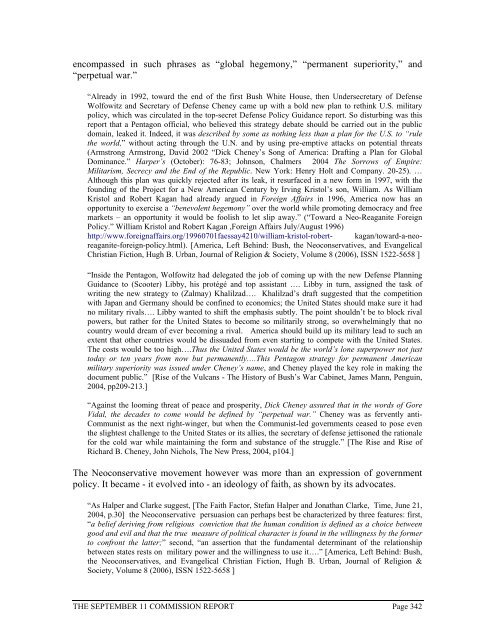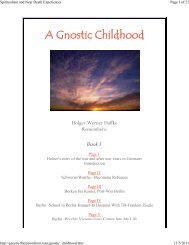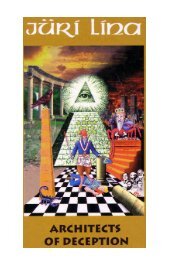September 11 Commission Report - Gnostic Liberation Front
September 11 Commission Report - Gnostic Liberation Front
September 11 Commission Report - Gnostic Liberation Front
You also want an ePaper? Increase the reach of your titles
YUMPU automatically turns print PDFs into web optimized ePapers that Google loves.
encompassed in such phrases as “global hegemony,” “permanent superiority,” and<br />
“perpetual war.”<br />
“Already in 1992, toward the end of the first Bush White House, then Undersecretary of Defense<br />
Wolfowitz and Secretary of Defense Cheney came up with a bold new plan to rethink U.S. military<br />
policy, which was circulated in the top-secret Defense Policy Guidance report. So disturbing was this<br />
report that a Pentagon official, who believed this strategy debate should be carried out in the public<br />
domain, leaked it. Indeed, it was described by some as nothing less than a plan for the U.S. to “rule<br />
the world,” without acting through the U.N. and by using pre-emptive attacks on potential threats<br />
(Armstrong Armstrong, David 2002 “Dick Cheney’s Song of America: Drafting a Plan for Global<br />
Dominance.” Harper’s (October): 76-83; Johnson, Chalmers 2004 The Sorrows of Empire:<br />
Militarism, Secrecy and the End of the Republic. New York: Henry Holt and Company. 20-25). …<br />
Although this plan was quickly rejected after its leak, it resurfaced in a new form in 1997, with the<br />
founding of the Project for a New American Century by Irving Kristol’s son, William. As William<br />
Kristol and Robert Kagan had already argued in Foreign Affairs in 1996, America now has an<br />
opportunity to exercise a “benevolent hegemony” over the world while promoting democracy and free<br />
markets – an opportunity it would be foolish to let slip away.” (“Toward a Neo-Reaganite Foreign<br />
Policy.” William Kristol and Robert Kagan ,Foreign Affairs July/August 1996)<br />
http://www.foreignaffairs.org/19960701faessay4210/william-kristol-robert- kagan/toward-a-neoreaganite-foreign-policy.html).<br />
[America, Left Behind: Bush, the Neoconservatives, and Evangelical<br />
Christian Fiction, Hugh B. Urban, Journal of Religion & Society, Volume 8 (2006), ISSN 1522-5658 ]<br />
“Inside the Pentagon, Wolfowitz had delegated the job of coming up with the new Defense Planning<br />
Guidance to (Scooter) Libby, his protégé and top assistant …. Libby in turn, assigned the task of<br />
writing the new strategy to (Zalmay) Khalilzad…. Khalilzad’s draft suggested that the competition<br />
with Japan and Germany should be confined to economics; the United States should make sure it had<br />
no military rivals…. Libby wanted to shift the emphasis subtly. The point shouldn’t be to block rival<br />
powers, but rather for the United States to become so militarily strong, so overwhelmingly that no<br />
country would dream of ever becoming a rival. America should build up its military lead to such an<br />
extent that other countries would be dissuaded from even starting to compete with the United States.<br />
The costs would be too high….Thus the United States would be the world’s lone superpower not just<br />
today or ten years from now but permanently….This Pentagon strategy for permanent American<br />
military superiority was issued under Cheney’s name, and Cheney played the key role in making the<br />
document public.” [Rise of the Vulcans - The History of Bush’s War Cabinet, James Mann, Penguin,<br />
2004, pp209-213.]<br />
“Against the looming threat of peace and prosperity, Dick Cheney assured that in the words of Gore<br />
Vidal, the decades to come would be defined by “perpetual war.” Cheney was as fervently anti-<br />
Communist as the next right-winger, but when the Communist-led governments ceased to pose even<br />
the slightest challenge to the United States or its allies, the secretary of defense jettisoned the rationale<br />
for the cold war while maintaining the form and substance of the struggle.” [The Rise and Rise of<br />
Richard B. Cheney, John Nichols, The New Press, 2004, p104.]<br />
The Neoconservative movement however was more than an expression of government<br />
policy. It became - it evolved into - an ideology of faith, as shown by its advocates.<br />
“As Halper and Clarke suggest, [The Faith Factor, Stefan Halper and Jonathan Clarke, Time, June 21,<br />
2004, p.30] the Neoconservative persuasion can perhaps best be characterized by three features: first,<br />
“a belief deriving from religious conviction that the human condition is defined as a choice between<br />
good and evil and that the true measure of political character is found in the willingness by the former<br />
to confront the latter;” second, “an assertion that the fundamental determinant of the relationship<br />
between states rests on military power and the willingness to use it….” [America, Left Behind: Bush,<br />
the Neoconservatives, and Evangelical Christian Fiction, Hugh B. Urban, Journal of Religion &<br />
Society, Volume 8 (2006), ISSN 1522-5658 ]<br />
THE SEPTEMBER <strong>11</strong> COMMISSION REPORT Page 342







